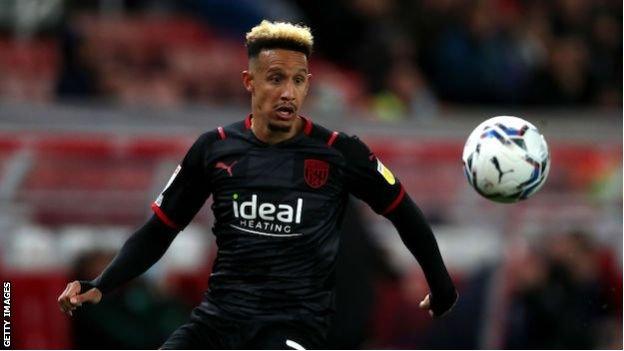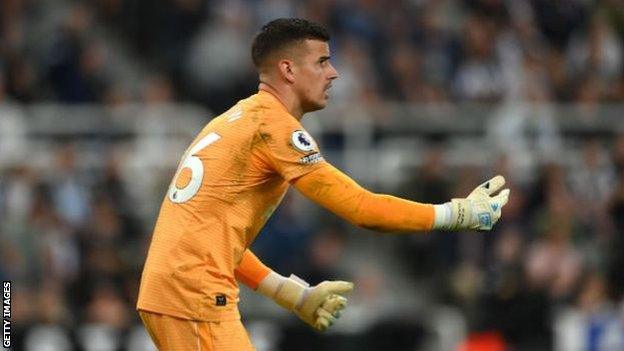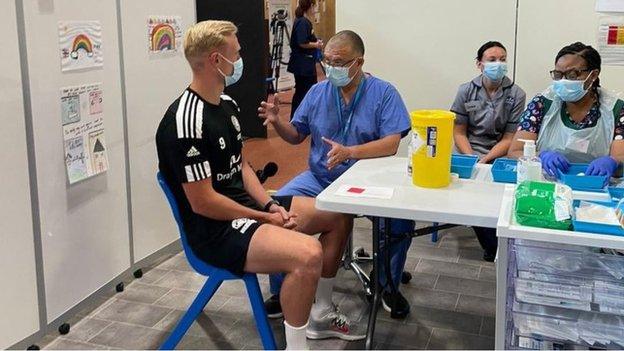Why are some footballers vaccine hesitant & what happens next?
- Published

West Brom forward Callum Robinson does not want to be vaccinated
Football managers, the Premier League, governing bodies and even politicians are weighing in on the issue of players being vaccinated against coronavirus.
On Tuesday, Republic of Ireland and West Brom forward Callum Robinson said he would not be vaccinated - despite having had Covid-19 twice.
So with fewer than half of players at most Premier League and English Football League clubs vaccinated, why might some players be hesitant and how could that impact football?
BBC Sport looks into the issue.
Rewards, red-list countries and role models
Football authorities want players to be double vaccinated, with the Premier League considering whether to "reward" clubs whose coronavirus vaccination rates are high.
As of two weeks ago, the squads of only seven clubs in the top flight were more than 50% fully vaccinated.
One of those is Wolves, who confirmed to BBC Sport that, since July, 100% of their first team players and staff have been fully vaccinated.
Last week, Liverpool boss Jurgen Klopp said "99%" of his players had been vaccinated and that he did not understand the hesitancy of some.
In Scotland, BBC Sport understands all but four members of the national squad and backroom staff have received two doses of the vaccine.
In the English Football League, meanwhile, the BBC understands that, as of September, 49% of players are fully vaccinated - up from only 18% the previous month.

Around 60% or more of people in the typical age range of a professional footballer (18-36 years old) have had their first dose vaccination
Other Premier League managers have previously called on their players to get immunised, including Pep Guardiola, Mikel Arteta, Nuno Espirito Santo, Steve Bruce and Graham Potter.
"When all the scientists, all the doctors, all the big specialists about medicine say the only solution to eradicate or help to move forward after this two years of pandemic situation is being vaccinated, I think they should consider it," said Manchester City boss Guardiola, whose mother died after contracting coronavirus in April 2020.

Newcastle goalkeeper Karl Darlow was hospitalised with Covid-19
If further incentive is needed, it was announced that Premier League players are only allowed to travel to UK-designated 'red-list' nations, such as Brazil, to represent their countries in this month's World Cup qualifiers if they are fully vaccinated.
However - and contrary to some media reports - BBC Sport understands Fifa does not want any player to be prevented from playing in the Qatar 2022 World Cup because of their vaccination status, and is looking into alternatives to being fully vaccinated, including proof of recovery from Covid-19 or negative tests.
Meanwhile, Health Secretary Sajid Javid - reacting to reports several England squad members had refused, external to be vaccinated - said it was "disappointing".
"They are role models in society. People, especially young people, I think will look up to them and they should recognise that, and the difference that can make in terms of encouraging others," Javid said.
On Wednesday England players Fikayo Tomori, Tammy Abraham and Jesse Lingard were asked about their stance on vaccines and all three stressed that it was a personal choice.
Tomori did not reveal his vaccination status, saying: "We're public figures, in the public eye, so I definitely see why people are wondering or asking, 'If they're going to take it, I'm going to take it', 'If they're not going to take it, I'm not going to take it'.
"I don't think it's my place to put it out there if I've done this or done that to influence people. It's to leave people to their own if they want to do it or not."
Newcastle goalkeeper Karl Darlow is one player who has publicly called on fellow footballers to get the vaccine, after he was hospitalised with Covid-19 in July.
Speaking to BBC Sport in September, Darlow - having only just returned to full fitness after "awful fatigue" and losing five kilograms in weight - said his experience had convinced "a couple" of his team-mates to get immunised.
He added that "four or five" other Newcastle players remained unvaccinated "for hopefully genuine reasons".
But vaccination remains the player's personal choice - so what could those reasons be?
Misinformation, complacency and WhatsApp groups
In the UK, almost 49 million people have received a first dose of a Covid-19 vaccine, while almost 45 million have received a second - an uptake of 89.8% and 82.5% of over-16s respectively., external
However, some people choose not to be vaccinated, citing a number of factors, including their lack of confidence in the vaccine, concerns about side-effects, or a fear of needles.
Others - a minority - opt out of vaccination because of their consumption of misinformation and conspiracy theories online, particularly on social media.
This has affected the uptake among footballers too.
In September, the Times reported that players had been sharing misinformation on WhatsApp groups, with PFA chief executive Maheta Molango, external urging them to not "believe all the myths and lies" online.
All players have received guidance from deputy chief medical officer Professor Jonathan van Tam, including a myth-busting video, external, and Boston United fan Van Tam also held a briefing with Premier League captains last month.

Professor Jonathan van Tam vaccinated Boston United players
Those messages were echoed by Rochdale club doctor Wesley Tensel, who told BBC 5 Live Breakfast on Tuesday that vaccination rates at the League One club were "very poor".
"I think one of the reasons is social media, the anti-vax stuff that's bandied around, and it does get passed around the changing room," he said.
"Football changing rooms are different to most workplaces. They're all together, it's an echo chamber, so if one of the senior players or an influential person has seen something on social media and that's passed to somebody else, they're not necessarily likely to critically appraise where that's come from and they can end up going down a rabbit hole."
Tensel is also a GP and is the clinical lead at a local vaccination centre. He says he messages the players when there is a clinic open but "it's got to the point now where nobody replies."
For West Brom forward Robinson, the decision not to get vaccinated is, he says, "my choice at this moment in time".
"It's obviously annoying that I've caught it twice but I haven't been vaccinated," he said. "Further down the line I could change my mind and want to do it."
His Republic of Ireland manager Stephen Kenny said: "There are a lot of myths and a lot of issues around virility that people are concerned about and other issues, and I do think it is complex. I am not a medical expert, but I do trust the experts and I do think it is better to be double-vaccinated."
Leeds United and Northern Ireland midfielder Stuart Dallas, who is double vaccinated, said nobody "can be forced into doing anything", but that he chose to get the vaccine "to get back to normality as soon as I could".
Another reason players are opting out could be complacency - infection rates in Premier League footballers this season are low.
Last week, the latest two rounds of lateral flow testing found four new positive cases among 2,927 players and staff at top-flight clubs
This figure has been in single digits each week since the week commencing 23 August. If so few players are catching coronavirus, why is vaccination an issue?
"These players are obviously young and fit so from one aspect I can understand why they may feel that its not necessary to be vaccinated," said Tensel.
"I've spoken to some of the senior players just to get their point of view as to why they think the uptake is low, and some of the responses are they don't want to feel unwell if they get the jab which may affect their performance.
"But obviously on the other hand if they were to get Covid, which quite a few of our players have had over the last year, they've been out for 10 days and felt really unwell so I don't think that argument really stacks up."
'You can't be forced into doing anything' - Dallas, McGinn & Baraclough on vaccine push
What could happen next?
So what does football do about it?
The numbers are slowly improving, and while just shy of half of EFL players are fully vaccinated, the league says 75% have had one dose, two doses, or intend to get the vaccine. That is up from 70% in August.
The EFL says it is actively working with the NHS to provide for mobile vaccine clinics at clubs, while in the Premier League, BBC Sport understands clubs are continuing to speak to their players to encourage them to get the vaccine.
The government also continues to work closely with clubs in a bid to increase vaccine uptake.
However, Republic of Ireland boss Kenny thinks it would be "quite radical" if players were not selected for overseas games on the basis of their vaccination status.
So perhaps football needs to look to other sports and their approach?
In rugby union, Saracens have reportedly made face masks and social distancing optional after hitting an 85% vaccination target, external.
But in US basketball's NBA, a tougher approach to protocols means unvaccinated players are being tested more and kept as far away as possible from those who are vaccinated where feasible.
They are also banned from "higher-risk settings", including restaurants and other entertainment venues.
Golden State Warriors forward Andrew Wiggins had his request for religious exemption from the Covid-19 vaccine rejected by the NBA, which said he could not play in any home games until he met San Francisco's health requirements on attending large indoor events - including elite athletes. He subsequently chose to have the vaccine.

Our coverage of your Premier League club is bigger and better than ever before - follow your team and sign up for notifications in the BBC Sport app to make sure you never miss a moment
